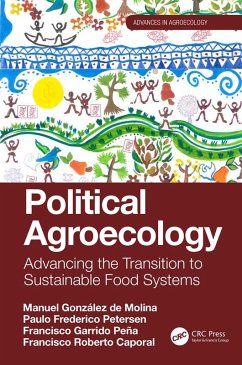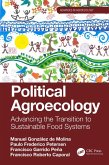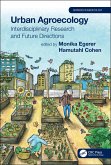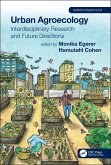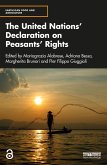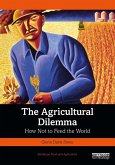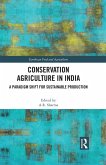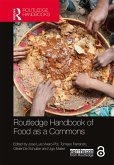Manuel González de Molina, Paulo Frederico Petersen, Francisco Garrido Peña, Francisco Roberto Caporal
Political Agroecology (eBook, PDF)
Advancing the Transition to Sustainable Food Systems
49,95 €
49,95 €
inkl. MwSt.
Sofort per Download lieferbar

25 °P sammeln
49,95 €
Als Download kaufen

49,95 €
inkl. MwSt.
Sofort per Download lieferbar

25 °P sammeln
Jetzt verschenken
Alle Infos zum eBook verschenken
49,95 €
inkl. MwSt.
Sofort per Download lieferbar
Alle Infos zum eBook verschenken

25 °P sammeln
Manuel González de Molina, Paulo Frederico Petersen, Francisco Garrido Peña, Francisco Roberto Caporal
Political Agroecology (eBook, PDF)
Advancing the Transition to Sustainable Food Systems
- Format: PDF
- Merkliste
- Auf die Merkliste
- Bewerten Bewerten
- Teilen
- Produkt teilen
- Produkterinnerung
- Produkterinnerung

Bitte loggen Sie sich zunächst in Ihr Kundenkonto ein oder registrieren Sie sich bei
bücher.de, um das eBook-Abo tolino select nutzen zu können.
Hier können Sie sich einloggen
Hier können Sie sich einloggen
Sie sind bereits eingeloggt. Klicken Sie auf 2. tolino select Abo, um fortzufahren.

Bitte loggen Sie sich zunächst in Ihr Kundenkonto ein oder registrieren Sie sich bei bücher.de, um das eBook-Abo tolino select nutzen zu können.
The book proposes theoretical, practical and epistemological foundations of a new theoretical and practical field of work for agroecologists: Political Agroecology .
- Geräte: PC
- mit Kopierschutz
- eBook Hilfe
Andere Kunden interessierten sich auch für
![Political Agroecology (eBook, ePUB) Political Agroecology (eBook, ePUB)]() Manuel González de MolinaPolitical Agroecology (eBook, ePUB)49,95 €
Manuel González de MolinaPolitical Agroecology (eBook, ePUB)49,95 €![Urban Agroecology (eBook, PDF) Urban Agroecology (eBook, PDF)]() Urban Agroecology (eBook, PDF)90,95 €
Urban Agroecology (eBook, PDF)90,95 €![Urban Agroecology (eBook, ePUB) Urban Agroecology (eBook, ePUB)]() Urban Agroecology (eBook, ePUB)90,95 €
Urban Agroecology (eBook, ePUB)90,95 €![The United Nations' Declaration on Peasants' Rights (eBook, PDF) The United Nations' Declaration on Peasants' Rights (eBook, PDF)]() The United Nations' Declaration on Peasants' Rights (eBook, PDF)37,95 €
The United Nations' Declaration on Peasants' Rights (eBook, PDF)37,95 €![The Agricultural Dilemma (eBook, PDF) The Agricultural Dilemma (eBook, PDF)]() Glenn Davis StoneThe Agricultural Dilemma (eBook, PDF)38,95 €
Glenn Davis StoneThe Agricultural Dilemma (eBook, PDF)38,95 €![Conservation Agriculture in India (eBook, PDF) Conservation Agriculture in India (eBook, PDF)]() Conservation Agriculture in India (eBook, PDF)40,95 €
Conservation Agriculture in India (eBook, PDF)40,95 €![Routledge Handbook of Food as a Commons (eBook, PDF) Routledge Handbook of Food as a Commons (eBook, PDF)]() Routledge Handbook of Food as a Commons (eBook, PDF)45,95 €
Routledge Handbook of Food as a Commons (eBook, PDF)45,95 €-
-
-
The book proposes theoretical, practical and epistemological foundations of a new theoretical and practical field of work for agroecologists: Political Agroecology.
Dieser Download kann aus rechtlichen Gründen nur mit Rechnungsadresse in A, B, BG, CY, CZ, D, DK, EW, E, FIN, F, GR, HR, H, IRL, I, LT, L, LR, M, NL, PL, P, R, S, SLO, SK ausgeliefert werden.
Produktdetails
- Produktdetails
- Verlag: Taylor & Francis eBooks
- Seitenzahl: 218
- Erscheinungstermin: 30. August 2019
- Englisch
- ISBN-13: 9780429768156
- Artikelnr.: 57603645
- Verlag: Taylor & Francis eBooks
- Seitenzahl: 218
- Erscheinungstermin: 30. August 2019
- Englisch
- ISBN-13: 9780429768156
- Artikelnr.: 57603645
- Herstellerkennzeichnung Die Herstellerinformationen sind derzeit nicht verfügbar.
Manuel González de Molina
Full Professor of Modern History. Coordinator of the Agro-Ecosystems History Laboratory (Universidad Pablo de Olavide, Seville, Spain). Co-director of Master Degree Program on Agro-ecology at International University of Andalusia from 1996 to now.
Paulo Federico Petersen
Doctorate in Environmental Studies from Pablo de Olavide University (Spain), Master in Agroecology and Rural Development from the Universidad Internacional de Andalucía (Spain), Graduated in Agronomy from the Federal University of Viçosa (Brazil). Executive coordinator of the NGO AS-PTA - Family Agriculture and Agroecology, vice-president of ABA-Agroecology (Brazilian Association of Agroecology) and editor-in-chief of "Agriculturas: experiencias em agroecologia" magazine.
Francisco Garrido Peña
PhD in Philosophy of Law (Universidad de Granada) and full professor on Politics and Law at Universidad de Jaén (Spain). His research activity is focused on Political Ecology, Ethics and Institutional Design.
Francisco Roberto Caporal:
PhD in Agroecology, Peasantry and History, from the Institute of Sociology and Peasant Studies (Córdoba University, Spain). Master in Rural Extension by Federal University of Santa Maria (1991) and graduate in Agronomy, Federal University of Santa Maria (1975). Currently, he works as Associate Professor of the Federal Rural University of Pernambuco, in the Department of Education, teaching in Rural Extension.
Full Professor of Modern History. Coordinator of the Agro-Ecosystems History Laboratory (Universidad Pablo de Olavide, Seville, Spain). Co-director of Master Degree Program on Agro-ecology at International University of Andalusia from 1996 to now.
Paulo Federico Petersen
Doctorate in Environmental Studies from Pablo de Olavide University (Spain), Master in Agroecology and Rural Development from the Universidad Internacional de Andalucía (Spain), Graduated in Agronomy from the Federal University of Viçosa (Brazil). Executive coordinator of the NGO AS-PTA - Family Agriculture and Agroecology, vice-president of ABA-Agroecology (Brazilian Association of Agroecology) and editor-in-chief of "Agriculturas: experiencias em agroecologia" magazine.
Francisco Garrido Peña
PhD in Philosophy of Law (Universidad de Granada) and full professor on Politics and Law at Universidad de Jaén (Spain). His research activity is focused on Political Ecology, Ethics and Institutional Design.
Francisco Roberto Caporal:
PhD in Agroecology, Peasantry and History, from the Institute of Sociology and Peasant Studies (Córdoba University, Spain). Master in Rural Extension by Federal University of Santa Maria (1991) and graduate in Agronomy, Federal University of Santa Maria (1975). Currently, he works as Associate Professor of the Federal Rural University of Pernambuco, in the Department of Education, teaching in Rural Extension.
Introduction. 1.Theoretical foundations of Political Agroecology 2.The
industrialization of agriculture and the enlargement of the food chain 3. A
regime on the road to collapse 4. Cognitive frameworks and institutional
design for an agroecological transition 5.Scaling Agroecology 6. The agents
of the agroecological transition 7. The role of the State and public
policies 8.References
industrialization of agriculture and the enlargement of the food chain 3. A
regime on the road to collapse 4. Cognitive frameworks and institutional
design for an agroecological transition 5.Scaling Agroecology 6. The agents
of the agroecological transition 7. The role of the State and public
policies 8.References
Introduction. 1.Theoretical foundations of Political Agroecology 2.The industrialization of agriculture and the enlargement of the food chain 3. A regime on the road to collapse 4. Cognitive frameworks and institutional design for an agroecological transition 5.Scaling Agroecology 6. The agents of the agroecological transition 7. The role of the State and public policies 8.References
Introduction. 1.Theoretical foundations of Political Agroecology 2.The
industrialization of agriculture and the enlargement of the food chain 3. A
regime on the road to collapse 4. Cognitive frameworks and institutional
design for an agroecological transition 5.Scaling Agroecology 6. The agents
of the agroecological transition 7. The role of the State and public
policies 8.References
industrialization of agriculture and the enlargement of the food chain 3. A
regime on the road to collapse 4. Cognitive frameworks and institutional
design for an agroecological transition 5.Scaling Agroecology 6. The agents
of the agroecological transition 7. The role of the State and public
policies 8.References
Introduction. 1.Theoretical foundations of Political Agroecology 2.The industrialization of agriculture and the enlargement of the food chain 3. A regime on the road to collapse 4. Cognitive frameworks and institutional design for an agroecological transition 5.Scaling Agroecology 6. The agents of the agroecological transition 7. The role of the State and public policies 8.References
